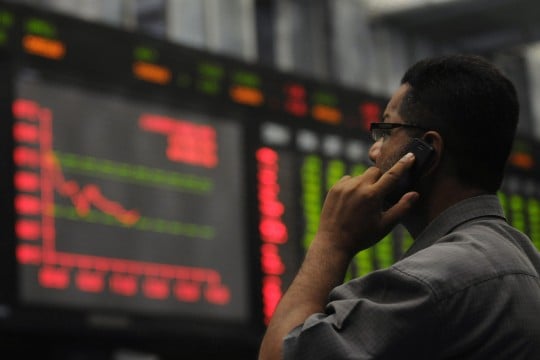
Bears held sway at the Pakistan Stock Exchange on Friday, as the benchmark KSE-100 index stayed in the negative territory throughout the session and dropped by 409 points on the first trading day after long Eid holidays.
Investors opted to stay on the sidelines as the trading volume and value dipped as compared to the previous trading session on April 28.
Across-the-board profit-selling was witnessed as market players were sceptical about the much-awaited resumption of International Monetary Fund (IMF) loan programme.
In addition, fresh depreciation of the rupee against the US dollar coupled with anticipation of interest rate hike in the upcoming monetary policy meeting also kept the trading environment dull.
The session commenced on a bleak note as the benchmark index declined during the initial hours of trading. However, with some oscillation, the index managed to end the first half at 45,084 points.
The second half witnessed across-the-board profit-selling, which dragged the index down to an intra-day low of 44,784 points.
Late-session buying activity helped recoup some of the losses, but the index settled below the psychological barrier of 45,000 points.
At close, the benchmark KSE-100 index recorded a decline of 408.60 points, or 0.9%, to settle at 44,840.81 points.
Topline Securities, in its report, said that Pakistan equities opened on a bearish note after long holidays.
During the trading hours, the market stayed in the negative zone and touched an intra-day low of 465 points before settling at 44,841 points.
Selling trend was witnessed across the board “as investors are still looking forward to concrete news flow regarding financial support from the friendly countries and the resumption of IMF programme”, Topline said.
Technology, bank and exploration and production sectors contributed negatively to the benchmark index, where Systems Limited, Habib Bank Limited, Meezan Bank, Oil and Gas Development Company and Pakistan Petroleum Limited lost 176 points cumulatively.
“On the flip side, Millat Tractors, Lotte Chemical Pakistan and Fauji Fertiliser Company saw some buying interest as they added 62 points collectively,” it added.
A report of Arif Habib Limited stated that the market opened in the red zone after week-long holidays.
Investors remained on the sidelines due to the rupee-dollar parity and rumours of policy rate hike in the upcoming monetary policy, it said.
Volumes remained dull throughout the day as profit-selling was witnessed across the board. On the contrary, hefty volumes were observed in third-tier stocks.
Sectors contributing to the performance included banks (-85.5 points), cement (-81.5 points), technology (-71.4 points), and exploration and production (-49.1 points), the report added.
JS Global analyst Mohammad Waqar Iqbal said that the downtrend continued at the local bourse, as the benchmark index closed at 44,841, down 409 points as compared to the previous trading session.
Summit Bank (+9.2%), Unity Foods (+2.9%), Cnergyico PK (-3.8%), Pakistan Refinery Limited (-6%) and Pak Elektron Limited (-1.6%) were the volume leaders.
“Going forward, we recommend investors to adopt a cautious approach,” the analyst said.
Overall trading volumes decreased to 189.5 million shares compared with Thursday’s (April 28) tally of 325.5 million. The value of shares traded during the day was Rs5.7 billion.
Shares of 333 companies were traded. At the end of the day, 90 stocks closed higher, 219 declined and 24 remained unchanged.
Summit Bank was the volume leader with 25.7 million shares, gaining Rs0.23 to close at Rs2.72. It was followed by Unity Foods with 18.2 million shares, gaining Rs0.69 to close at Rs24.31 and Cnergyico PK with 9.1 million shares, losing Rs0.24 to close at Rs6.11.
Foreign institutional investors were net sellers of Rs215.5 million worth of shares during the trading session, according to data compiled by the National Clearing Company of Pakistan.

















COMMENTS (2)
Comments are moderated and generally will be posted if they are on-topic and not abusive.
For more information, please see our Comments FAQ